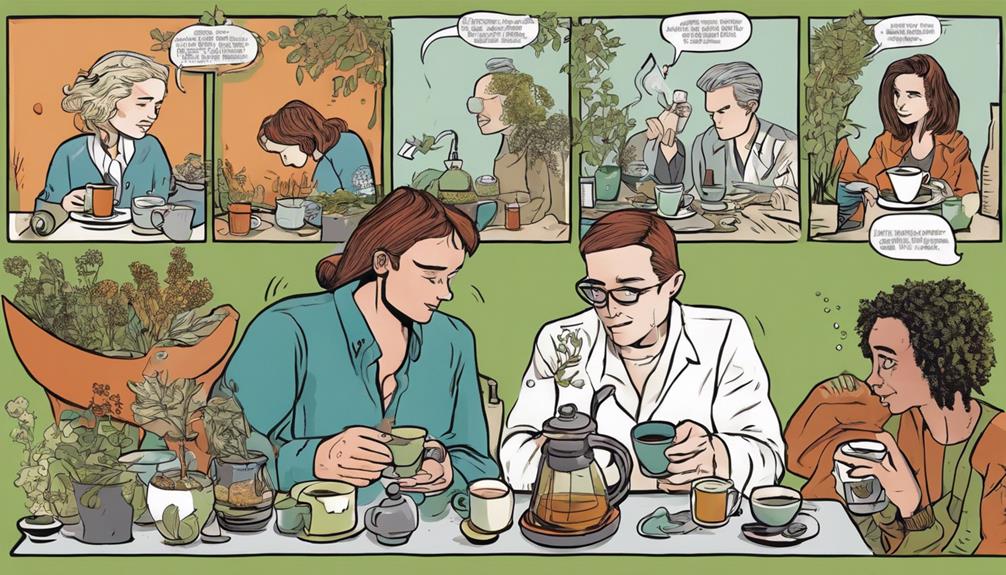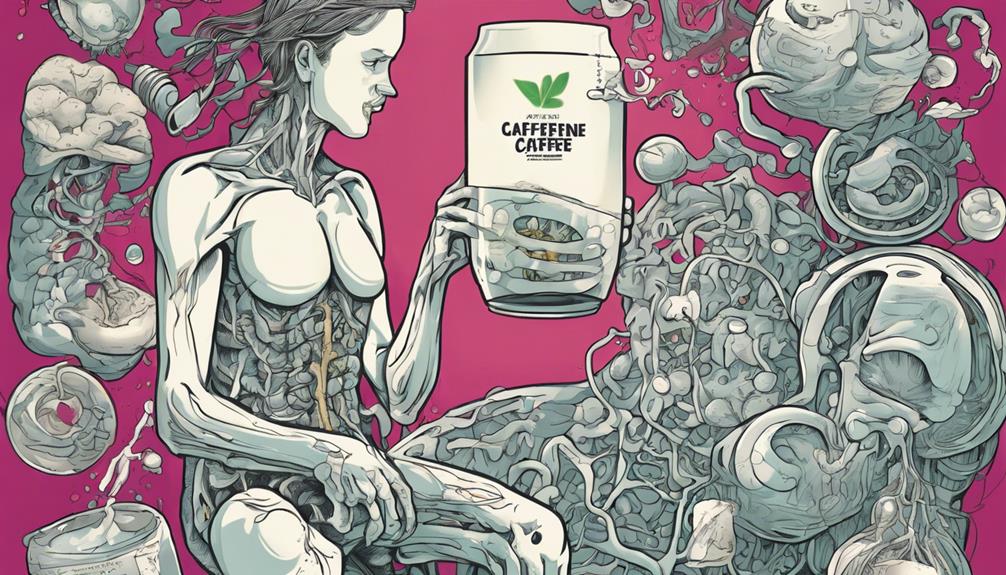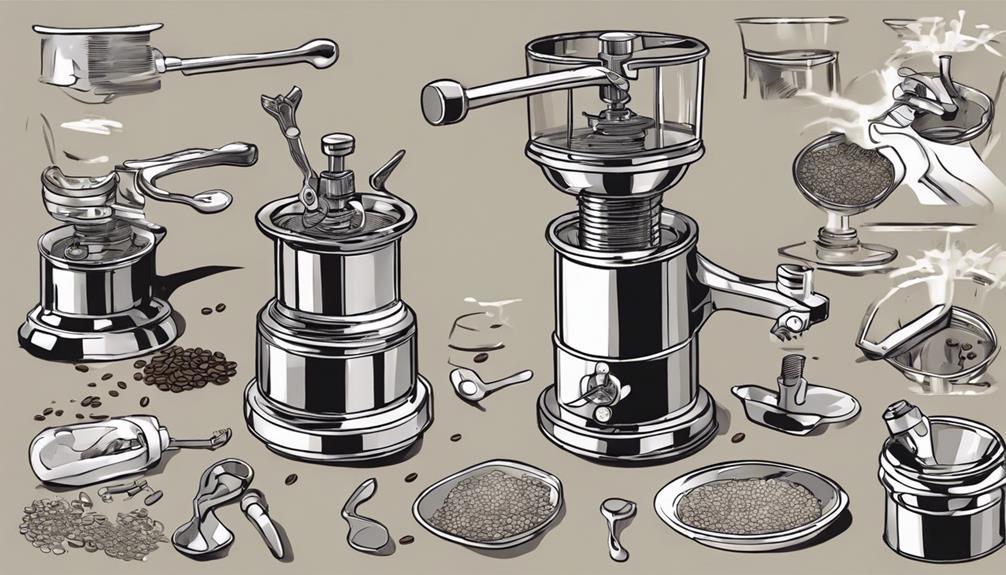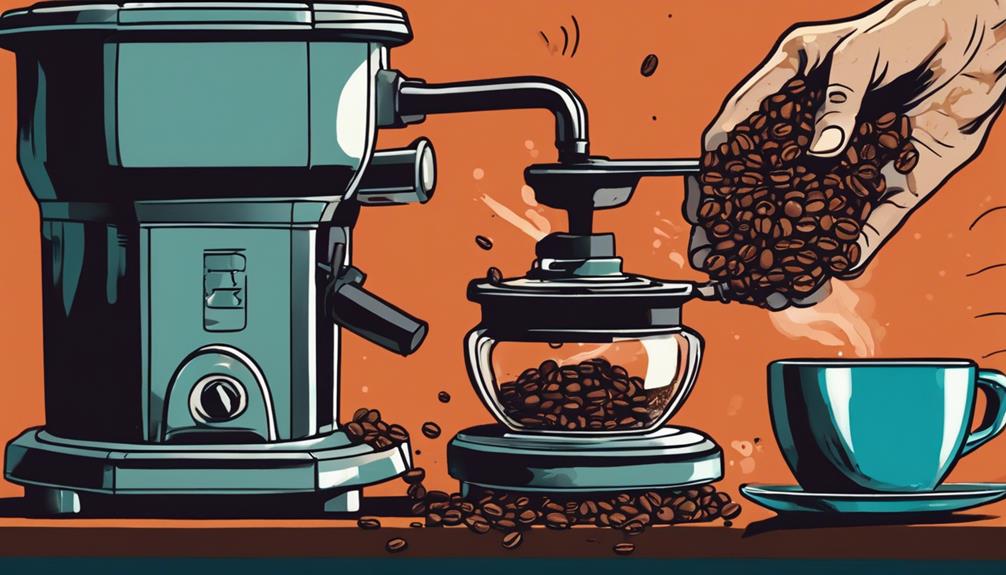To start living a healthier lifestyle, consider cutting down on coffee to decrease your caffeine consumption. Excessive caffeine can increase the risk of health issues like insomnia and elevated heart rate. Try slowly reducing your intake, keep track of your caffeine consumption in a diary, and switch to decaf or healthier alternatives. Be mindful of your intake, especially if you are pregnant or have underlying health conditions. Embrace changes in your lifestyle that support your well-being. Think about exploring other ways to boost your energy and alertness, such as regular physical activity and a well-balanced diet. Seek assistance from a healthcare provider or therapist to manage caffeine-related anxiety and transition to a lower caffeine lifestyle. Remember, making gradual adjustments can lead to long-lasting improvements in your overall health and wellness. Consider including meditation or mindfulness tactics in your daily routine to reduce stress and foster relaxation, which may help reduce reliance on caffeine for energy. Additionally, simplify tracking your caffeine intake by adding coffee to MyFitnessPal, a well-known app for monitoring nutrition and exercise. By implementing these changes and seeking professional advice, you can gradually decrease your caffeine intake and enhance your overall health and well-being. Remember, taking small steps towards a healthier lifestyle can result in long-term advantages.
Key Takeaways
- Gradually reduce coffee intake to avoid withdrawal symptoms and health risks.
- Explore decaf options as a substitute for regular coffee.
- Stay hydrated to combat the potential effects of cutting back on coffee.
- Get enough sleep to support your body during the caffeine reduction process.
- Replace coffee with healthier alternatives like herbal tea or fruit-infused water.
Understanding Caffeine Consumption
If you regularly consume caffeine, understanding the recommended daily limits set by health authorities is vital for maintaining a healthy lifestyle. Consuming caffeine in moderation can have health benefits, such as improved focus and alertness.
The FDA advises that healthy adults can safely consume up to 400mg of caffeine per day. However, pregnant women should limit their caffeine intake to less than 200mg daily to avoid potential risks. Additionally, children and adolescents shouldn't exceed 2.5mg of caffeine per kg of body weight per day to prevent adverse effects on their health.
To manage your caffeine intake effectively, consider cutting back on high-caffeine beverages like coffee. A standard 8-ounce cup of coffee can contain anywhere from 75-165mg of caffeine, so it's vital to monitor your consumption. If you find yourself exceeding the recommended limits, explore alternative beverages with lower caffeine content, such as herbal teas or decaffeinated coffee.
Prioritizing your health by regulating your caffeine intake can lead to a more balanced and sustainable lifestyle.
Individual Tolerance Factors

Understanding how individual tolerance factors influence your response to caffeine is essential for managing your overall health and well-being. Various factors, such as body size, genetics, and lifestyle choices, play a significant role in determining how your body reacts to caffeine. For example, lifestyle factors like pregnancy or oral contraceptive use can impact the metabolism of caffeine in your system. Some individuals naturally have a faster caffeine metabolism, which can reduce the negative effects of the substance on their bodies. However, it is crucial to be aware that excessive caffeine consumption can worsen existing heart conditions in certain individuals. By understanding these individual tolerance factors, you can tailor your caffeine consumption to lead a healthier lifestyle.
| Factor | Influence | Example |
|---|---|---|
| Body Size | Larger individuals may need more caffeine to feel its effects, while smaller individuals can be more sensitive to its stimulant properties. | Someone who is tall might require more caffeine to feel awake. |
| Genetics | Genetic variations can impact how efficiently your body metabolizes caffeine, affecting how long it stays in your system and its effects on you. | If your family has a history of fast metabolisms, you might also process caffeine quickly. |
| Lifestyle Choices | Pregnancy, oral contraceptive use, and other lifestyle factors can alter how your body processes caffeine, leading to varying responses to the substance. | Pregnant individuals may need to limit caffeine intake for health reasons. |
Health Risks of Excess Caffeine

Excess caffeine consumption can pose serious health risks to your well-being. It may lead to issues like gastrointestinal discomfort, trouble sleeping, and increased anxiety.
Be mindful of the dangers of overconsumption and prioritize moderation to safeguard your health.
Excessive Caffeine Dangers
Excessive consumption of caffeine poses significant health risks, including gastrointestinal problems, trouble sleeping, and heightened stress levels.
When you overdo it on caffeine, you may experience withdrawal symptoms when you try to cut back. These symptoms can range from severe headaches and difficulty concentrating to irritability.
It's essential to understand the health risks associated with excessive caffeine intake, such as increased heart rate and potential exacerbation of existing heart conditions.
Gradually reducing your caffeine intake is key to avoiding these dangers.
Too much caffeine can't only impact your daily functions and work performance but also affect your overall health and well-being.
Risks of Overconsumption
Consuming too much caffeine can greatly increase the risk of various health problems, including gastrointestinal issues, trouble sleeping, nervousness, anxiety, and an irregular heartbeat.
Overconsumption of caffeine may lead to increased heart rate, high blood pressure, and exacerbation of existing heart conditions. These health risks can interfere with daily functions, impacting productivity and overall well-being.
When you decide to cut back on caffeine intake, be prepared for withdrawal symptoms such as severe headaches, difficulty concentrating, and irritability. It's essential to be mindful of your caffeine consumption and gradually reduce it to avoid these negative health effects.
Health Hazards From Caffeine
When it comes to your health, being mindful of the potential health hazards associated with caffeine consumption is essential. Excessive intake of caffeine can lead to various health issues such as gastrointestinal problems, sleep disturbances, nervousness, anxiety, and irregular heartbeat. These risks can interfere with your daily functions, impacting your overall well-being.
Increased heart rate, restlessness, and exacerbation of existing heart conditions are also linked to consuming too much caffeine. It's important to monitor your caffeine consumption to prevent negative health effects and consider reducing it for a healthier lifestyle.
If you find cutting back on caffeine challenging or experience severe withdrawal symptoms like headaches or fatigue, seeking professional help may be necessary. Understanding the health risks of excess caffeine consumption and taking steps to limit your intake can contribute to better overall health and well-being in the long run.
Strategies for Cutting Back

To start cutting back on caffeine, gradually reduce your intake to avoid withdrawal symptoms.
Keep a caffeine diary to track your sources of caffeine, and remember to stay hydrated and get enough sleep.
Taking these steps can help you manage any discomfort and successfully decrease your caffeine consumption.
Withdrawal Symptoms Management
If you're aiming to reduce your caffeine intake and manage withdrawal symptoms effectively, gradually decreasing your consumption is a recommended strategy. Here are three vital tips to help you navigate through this process:
- Stay Hydrated:
Drinking plenty of water can alleviate some withdrawal symptoms like headaches and fatigue. Hydration supports your body as it adjusts to lower caffeine levels.
- Prioritize Sleep:
Ensuring you get enough quality sleep is pivotal during this period. Adequate rest can help combat the tiredness and irritability often experienced when cutting back on caffeine.
- Practice Self-Care:
Engage in activities that promote relaxation and well-being. Exercise, meditation, or hobbies can distract you from cravings and reduce stress, making it easier to manage withdrawal symptoms.
Tracking Caffeine Intake
Gradually decreasing your caffeine consumption begins with monitoring your daily intake to pinpoint origins and make informed choices on scaling down. Maintaining a caffeine log can be a useful tool in this journey, enabling you to track your consumption from various origins such as coffee, tea, energy drinks, soda, cocoa, and chocolate.
By recognizing these origins, you can gain a better understanding of where your caffeine intake is originating from and progressively lessen your consumption to prevent withdrawal symptoms like headaches and irritability.
When monitoring your caffeine intake, it's crucial to be aware of concealed origins of caffeine in your diet. Keep in mind to stay hydrated and prioritize achieving sufficient sleep as you scale down on caffeine to assist your body through the adjustment.
If you encounter difficulty in reducing your caffeine intake or face persistent withdrawal symptoms, don't hesitate to seek professional assistance for guidance and support in effectively managing this process.
Sources and Reduction of Caffeine

Consider various sources of caffeine in your diet and start by identifying the ones you can reduce or replace with alternatives to gradually decrease your intake.
Here are some steps to help you in this process:
- Switch to Decaf Options: Opt for decaffeinated coffee or tea to enjoy the taste without the caffeine content.
- Limit Energy Drink Consumption: Energy drinks are often packed with caffeine, so try reducing the number of energy drinks you consume or switch to healthier alternatives like herbal teas.
- Check Food Labels: Be mindful of hidden sources of caffeine in food products like chocolate or certain medications. Reading labels can help you make informed choices and cut back on unexpected caffeine intake.
Caffeine Metabolism Insights

Understanding how your body metabolizes caffeine is essential for making informed choices about your consumption habits and overall health.
Various factors influence caffeine metabolism, with genetic makeup playing a significant role. For instance, some individuals metabolize caffeine quickly, while others do so at a slower rate. This variability can impact how caffeine affects your body and how long it stays active in your system.
The half-life of caffeine, which is the time it takes for half of the caffeine to be eliminated from your body, can vary widely from 1.5 to 9 hours based on individual genetic factors.
To gain a better understanding of caffeine metabolism, it's important to take into account your individual tolerance levels and how they relate to your caffeine consumption. Lifestyle habits such as smoking and medications can also influence how your body processes caffeine.
Risks and Health Effects

To understand the risks and health effects associated with caffeine consumption, it's important to be mindful of the potential negative impacts on your overall well-being.
Here are three key points to keep in mind:
- Excessive caffeine consumption can have detrimental effects on your health, such as gastrointestinal problems, trouble sleeping, nervousness, anxiety, and irregular heartbeat. It's essential to monitor your intake to prevent these issues.
- Withdrawal symptoms from caffeine, such as severe headaches, difficulty concentrating, and irritability, can occur when trying to cut back. Gradually reducing your caffeine intake can help alleviate these unpleasant side effects.
- Pregnant individuals should be especially careful with their caffeine consumption, limiting it to less than 200 milligrams per day to reduce risks to both themselves and their unborn child.
Additionally, heavy consumption of caffeine from energy drinks has been linked to anxiety and unsafe behaviors, particularly concerning in adolescents due to the potential health risks associated with excessive caffeine intake.
Weight Management Tips

Boost your weight management efforts with these practical tips for managing your coffee consumption. When it comes to weight management, caffeine can be a helpful tool. It can increase your metabolism and reduce your appetite, aiding in your weight loss journey.
Opting for black coffee is a smart choice as it has minimal calories, unlike creamy and sugary coffee options that can contribute to weight gain. Remember, moderation is key. Consuming caffeine in reasonable amounts can help control your weight by boosting your energy expenditure.
Be cautious of high-calorie coffee drinks like lattes and mochas, as they can sabotage your weight management efforts. Choosing unsweetened alternatives and keeping an eye on your overall calorie intake from coffee beverages can make a significant difference in your weight control goals.
Make informed choices when it comes to your caffeine consumption to support your weight management journey effectively.
Special Considerations for Intake

Consider moderating your caffeine intake with these special considerations in mind.
When it comes to managing your caffeine intake, there are a few important factors to keep in check:
- Limit Your Cups Per Day: If you're pregnant, it's important to restrict your caffeine consumption to less than 200 milligrams per day. This can help reduce potential risks and ensure a healthier pregnancy.
- Beware of Withdrawal Symptoms: When shifting to decaffeinated beverages, be aware that withdrawal symptoms may occur. To alleviate these symptoms, consider gradually adjusting your intake to make the shift smoother.
- Monitor Decaffeinated Beverages: Although decaffeinated coffee is a popular alternative, it still contains varying amounts of caffeine, ranging from 2 to 15 milligrams. It's vital to carefully monitor your consumption to stay within your desired caffeine limits.
Lifestyle Changes for Health

Gradually reducing your coffee intake can lead to positive lifestyle changes for improved health and well-being. As you start on this journey to lower your caffeine consumption, it's crucial to recognize that you may experience withdrawal symptoms like headaches and irritability.
However, by implementing strategic lifestyle adjustments, you can alleviate these effects and shift smoothly. Cutting back on coffee not only improves sleep quality and reduces anxiety levels but also opens up opportunities to try alternative beverages such as herbal teas or decaffeinated options.
Increasing your water intake and participating in regular physical activity can help counteract the initial impact of caffeine withdrawal, aiding in feeling more invigorated and balanced. Embracing new morning rituals and integrating relaxation practices into your daily routine can further bolster this transition away from coffee consumption.
Frequently Asked Questions
What Is a Healthier Alternative to Coffee?
Looking to switch it up from coffee? Try green tea for a moderate caffeine boost or herbal teas like chamomile for a soothing brew. Matcha powder offers sustained energy, while golden milk provides a caffeine-free, anti-inflammatory option.
Does Quitting Coffee Improve Health?
Giving up coffee can boost your health. Improved sleep, regulated blood pressure, decreased risk of GI issues, and better hydration are benefits. You'll feel less anxious, have fewer heart palpitations, and reduce caffeine reliance.
Is It Healthy to Cut Out Caffeine?
Cutting out caffeine can improve sleep, reduce anxiety, regulate blood pressure, enhance hydration, stabilize energy, balance hormones, and reduce stimulant reliance. It's a healthy choice for overall well-being and avoiding potential health issues.
How Do You Wean off Caffeine Safely?
To wean off caffeine safely, gradually decrease intake, track consumption, switch to decaf or herbal teas, stay hydrated, and guarantee enough rest. Seek professional help if needed. Managing withdrawal symptoms like headaches and irritability is key.
Conclusion
Take control of your caffeine intake to improve your overall health and well-being. By implementing strategies to cut back on coffee and other sources of caffeine, you can reduce your risk of negative health effects and manage your weight more effectively.
Remember, moderation is key when it comes to caffeine consumption. So, grab a glass of water instead of that third cup of coffee and watch your health bloom like a flower in a caffeine-free garden.









